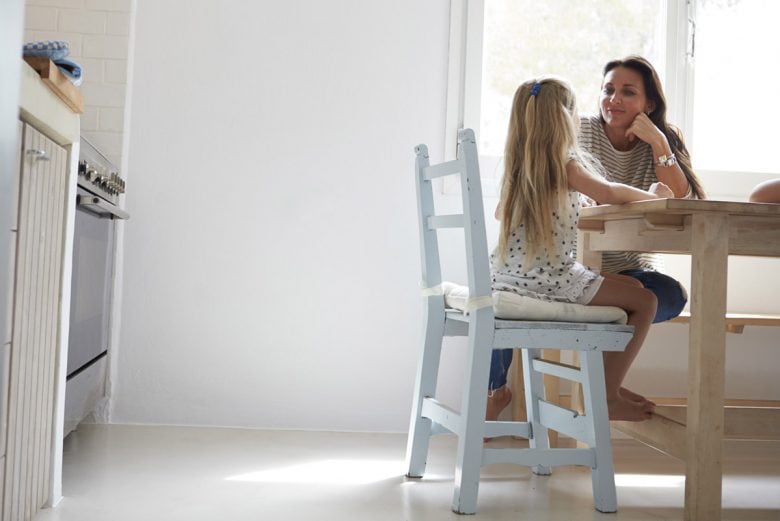
How do you have “The Talk” with your children?
You want to get it right. But you’re not sure the best way or best age to go about it. How do you talk with your child about sex? In this episode, Carol and Anne share the two kinds of conversations that should happen separately. They also give specific tips for how to approach this topic with each of the 4 Types of children. Listen and feel more confident the next time your child seems curious.
This episode’s Parenting Practice
Pay attention to your intuition. What opportunities are presenting for you to talk with your children about sex? Use the tips in this episode to have the conversations that set your children up for healthy, successful sexual experiences when they get older.
Transcript of podcast episode
Carol: I was put in an awkward situation at, you know, age 23 to now stand in front of a class of 17-year-old boys and say, “This is a penis.” You know, it was, I remember that going, “All right, here we go.”
Welcome to the Child Whisperer Podcast. I’m your host, Carol Tuttle, author of the bestselling parenting book, The Child Whisperer. I’m with my cohost, Anne Tuttle Brown.
Anne: “How did you have the talk with your children? My oldest is a Type 4 and experts say to start talking around the age of eight. He’s not very curious about it yet, but I want to be prepared when we arrive at that moment.”
Carol: I’d say eight is late these days. I’m like, really? You can wait until your child is eight with all that they’re exposed to? I mean, you’ve done this much earlier.
Anne: Yeah, we started at age three, and now age two, really now that we’ve got a two-year-old. But yeah, with our oldest, it was age three we started talking about sex.
Carol: Right. Well, and you’ve done it in a way that it’s made it…
Anne: The talk, just so we’re clear, is talking about sex.
Carol: I wanted to speak to that actually, that I’m not a fan of alluding to what we’re talking about here. I mean, I’m all about calling things what they are, it’s sexual development, it’s part of their physiology. So I had an opportunity to answer someone’s question about this quite a while ago on the Facebook group and I’m going to read what I wrote in my reply to their inquiry.
“In my opinion, there is the physiology talk about our bodies and its functions, and the morality talk that is about sharing your values as a parent. And I think they are two separate conversations. Not enough parents give enough attention to the physiology talk so children grow up knowing how their bodies work. When they know, they tend to have more respect for their bodily functions. The morality talk is about choices and can be very spiritual rather than a conversation that generates shame around sex.”
So we’re going to be talking today about the physiology talk. That’s your business and your matter and your role as a parent, that you need to come together with the other parent to decide what the morality talk is about and when you want to do that.
Because I’m going to encourage you not to always connect the two. In fact, once a child, let’s say your child, when Katie asked at three and you were teaching the physiology to always tag on the, “But you’re not going to do that until you’re married,” or, “You’re not supposed to do that,” and… because now you’ve shamed it. See, so those need to be separated so that they are both positive. Because morality has a lot more to do with when you choose to have sex. It’s about respecting your body at large, other people’s. And, you know, in today’s world, you should be talking about, in that conversation, how we treat others, how we perceive others, that we don’t assume that we have, you know, just that we respect other people’s bodies and we don’t touch people in certain ways, you know, that there is that conversation that now goes beyond just when you’re choosing to have sexual intercourse in your life.
Anne: So like I shared, it was at age three, I was pregnant with our second child and she naturally had questions. And so rather than, you know, being like, “Oh, the baby comes out of mommy’s tummy?” And I was like, “No, we’re going to get right to it.”
Carol: Well, and that’s not even technically correct.
Anne: Well, actually Katie did come out of my tummy, she was a C-section, so I guess it depends, case by case. But I decided I wanted to be really clear and direct, and that was my approach. And keeping it really focused on the circle of life, the biology of how a baby is created. And so that’s where we started, was there is a sperm and there is an egg. And there’s YouTube videos where there’s like, I don’t know how they got the camera on the sperm, but you’re following the sperm’s adventure and it’s traveling to the egg and then over course, over the nine months, it shows how a baby is developed.
And then we would look at books where it would show like month one, what the baby looked like, month two. And the opportunity presented itself really naturally as there was a new baby coming into our life. But even if your child is the youngest or you don’t have, your child doesn’t have siblings, there are babies being born all around the world, like there’s an easy way to bring this up. And so she did have questions. And so we started with the sperm and the egg, and then we went next level, the sperm gets to the egg by the penis going in the vagina. And talking about keeping it very basic and straightforward.
Carol: Right. I was a high school teacher, that’s what my undergrad is, in secondary ed. And I had to teach this unit to 16 to 18-year-olds. It was a unit that was, the origins of life into now in the intimacy of it, so the anatomy of it, body parts. So I learned from that experience that I needed as a parent, really own the space in a way to talk about it in a respectful way, to call our physiology what our physiology is and not to use nicknames or—
Anne: Wee-wee or bum bum, we’ve always used vagina or vulva and penis and bum bum.
Carol: So you were influenced by this because I was put in an awkward situation at, you know, age 23 to now stand in front of a class of 17-year old boys and say, “This is a penis,” you know. I remember that going, “All right, here we go.” And I did it and I learned from that, you know, why is that so hard to say? And we’ve shamed a lot of our references to our body, and that’s why we would give it another name, like we can’t talk about this, so we’ll kind of talk around it. So I’m like, just go on there, we’re talking about it.
Anne: And I think at first it can feel a little bit unfamiliar coming out of your mouth, sex can feel like a silly word.
Carol: Because probably nobody talked to you that clearly. A good chance that didn’t happen.
Anne: I remember making a conscious decision, “Okay, what are we going to call these body parts?” You know, just call them what they are and it makes the conversation more natural and easier.
Carol: Hold that thought, let’s continue this discussion after a short break.
Announcer: Knowing your Type and your child’s Type changes everything, doesn’t it? It helps you to understand one another better, it can help your outside too. When you wear clothes that express your type, you feel better, you look better, and people understand you more easily including your kids. Carol Tuttle created the “Dressing Your Truth” program to help you dress true to your type and create a personal style that expresses who you really are. The best part, you can learn all the basics for free. Start loving how you look and feel at dressingyourtruth.com.
Anne: After we talked about the biology about it and she had more question as she’s gotten older, she’s seven now. Now we’re talking about the intimacy of it, the feelings that it might create. And, you know, teaching that it’s something that her mom and dad do and experience together, and just building on that. And it happens here and there when she has questions, it’s very natural, it’s more comfortable.
Carol: Seems like you’re, and this is what I think is more typical, you’ll satisfy and they’ll be like, “Okay,” it’s not like this sit-down thing, and now we’re going to talk about this. You’re letting it come up naturally, and it’s a safe conversation and you can talk to us about this, but you then don’t need to keep going about it. It’s like, “This is enough for now,” and you get a sense of that as a parent.
Now, if you have a child that’s a Type 4 and a Type 2 might be more timid about this topic. And so they very well may not bring it forward to you because they’re more of an introvert energy, and yet they may have been exposed to things definitely in school earlier than you might have appreciated. So you need to check in with your children that are more inward moving to just see where they’re at with it and that it is a comfortable conversation and something you want to introduce to them, so that you’re not leaving them to other sources being the information conveyors of sexuality and their sexuality. Because, again, it gets talked about in a probably more crass way when it’s in a peer setting.
Anne: Oh yeah. And then probably don’t have all the facts either, if they’ve gotten the talk from their parents or not, like who knows what information is being shared? Let’s share some tips for each Type about how to approach talking about sex with your child.
For Type 1, keep it light and random. Know that the conversations can be really short and here and there. Let them do the talking and asking the questions, and this approach will allow the trust to be built so that they can come to you rather than going to their friends, and they can feel like it’s something that’s light and easy to talk about with you.
For Type 2, I think books can be a really good support with pictures and explanations, like the cycle of life or even the anatomy books, and just asking, doing a followup, “Do you have any more questions about what we talked about the other day? Does this make you feel uncomfortable in any way?” Just creating a safe place, and obviously doing it in a more private setting.
For Type 3, being really direct and just straightforward, cut and dry. And also I’d advise them not to tell other kids, because I know my Type 3 daughter, when she feels like she knows something and she’s now like feels like a big kid or has some exciting knowledge, that she wants to go and tell other people. And so we had to do that with the Santa talk, too. Like, “Don’t tell other people, they can talk about it with their parents.” Okay? “If you have more questions or if you hear things, come and talk to us.” And my goal with my children is that they don’t ever remember like the talk happening, they’ve always remembered talking about sex with their parents.
Carol: Right. In a way that they learn, they acquire a respect for their bodies in the way it’s talked about, and they appreciate the power we have and the beautiful function of our bodies.
Anne: I’ve heard from a lot of people that have grown up on farms, they’re like, “I never had to have the talk, I grew up around animals, I knew how it happened.”
Carol: Yeah, because he had cows and sheep.
Anne: And I think that like just the basic functions of human life comes down to sex. Type 4, make it really straightforward, a book or a diagram, and then creating this space of, “What are your thoughts on that?” And just keeping it really private, and maybe even a little bit more formal, for a Type 4, I think what could be appropriate, like, “I want to talk to you about this,” or, and keeping it just really respectful.
Carol: This is a subject matter where we can’t really advise you on a certain age or stage in life like potty training or language skills, you really need to be prayerful or in whatever manner you approach your spiritual guidance, your intuition as a parent to ask that it will be presented to you in a timely way so that you will know how to speak to this, when to speak to it, in a manner that really builds a respect for your child and their body, and that it’s a comfortable conversation that’s dealt with in a spiritual way, if that’s your preference, that you’ll be able to really make this something a beautiful thing that they can look back on and say, “You know, my parents handled that really, really well.”
And how does each parent get involved in it? In many family scenarios, there’s like one parent that becomes the voice of this when it really needs to be the voice of both parents in certain scenarios. And dads need to talk about certain things with their sons, and moms with daughters, and even together as parents. So they see you’re both comfortable talking about it together, and your experience of how it adds pleasure and it’s such a beautiful thing in your marriage.
So, you know, that’s where you need to have… don’t wait till it’s like we introduced this episode with, “When am I supposed to have the talk?” We’re hoping that you’ll take this to heart and realize there’s an opportunity many, many, many times in a child’s life to be able to teach this. And then again to make a decision around the morality side of this, and what are your values you want to teach your children, inspire them to have certain choices in their life based on what you’ve chosen and why that would be the case, and really encourage them to choose into that themselves rather than forcing them.
We just live in a world today where there’s so much choice that when a child feels forced, they’re too often wanting to go against that because the world says you can do whatever you want. And you pretty much can, you know. So they want to be inspired to make certain choices because they feel it’s correct and they’re choosing that which is correct for them, and they’re supported and it’s celebrated.
So this week’s Parenting Practice is to really bring, take this to heart, even to make it a matter of prayer, and to pay attention to the opportunities that present and even the promptings that present that this is something that you’re being asked to do as a parent, that you’re getting those impulses, and that intuition is guiding you so this can be a successful experience in your parent-child relationship. And you set them up for success in having a beautiful experience with their own sexuality and the sexual experiences that they then are involved in their adult life.
Thanks for listening. For more support, go to thechildwhisperer.com where you can purchase the book, subscribe to our weekly Parenting Practice email, and find a transcription and audio of the “Child Whisperer Podcast.”
Anne: If you’re listening on iTunes, thank you for leaving a review. If you have a parenting question, please send it to [email protected].



